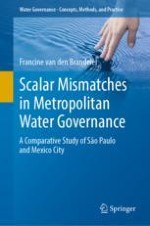The book provides insights into the particular nature of water-related challenges in metropolitan regions of the Global South and the “scalar mismatches” that prevent their sustainable and inclusive development. It argues for the adoption of a metropolitan water governance approach to assess these challenges, including the drivers and institutions that shape these, and the policy instruments at river basin and urban scales that aim to address these. The cases of Mexico City and São Paulo, as two mega-cities with a wide ranging of water-related challenges, present lessons to other fast growing urban agglomerations on the variety of possible responses as well as obstacles to their effectiveness that receive little attention.
